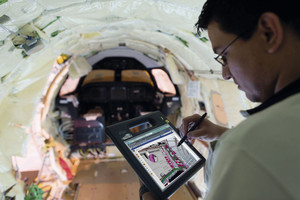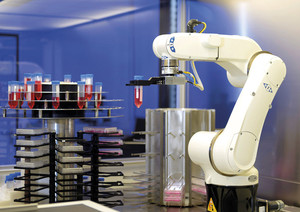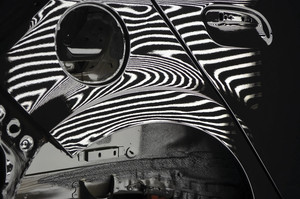
Embraer
Aircraft assembly at Embraer did away with paper designs and the entire process is digitally monitoredEmbraerBusiness entities, the government and funding agencies in Brazil are discussing strategies to organize and promote the dissemination of advanced manufacturing, a set of technologies that sustains intelligent industrial processes. The challenge is to ensure Brazilian industry competitiveness in the face of a transformation taking shape in Europe and the United States, providing increased efficiency and flexibility to production lines and reducing costs. The trend is also known as Industry 4.0, alluding to what would constitute a fourth industrial revolution–with an impact on the means of production equivalent to that obtained through the invention of the steam engine along with the arrival of electricity to factories in the 19th century, and, more recently, the integration of electronics and automation on factory floors.
The development of advanced manufacturing in various production chains will have a growing impact on domestic industry, says economist Rafael Moreira, an advisor on Industry 4.0 at the Ministry of Industry, Foreign Trade and Services (MDIC). “Competitive pressure will be increasingly intense and Brazilian companies will feel the need to modernize,” suggests Moreira, who leads an MDIC work group established in July 2017 for the purpose of establishing a national policy on advanced manufacturing. “Some Brazilian companies are already positioned in more mature stages of Industry 4.0, but they are the exception. Certain research institutions are state-of-the-art in terms of some Industry 4.0 technologies, although they have a weak connection to the industrial fabric.” Moreira believes it will be a challenge to balance the demands of Brazil’s industrial segments with the necessary investments in research and development (R&D) in order to generate new technologies. One focus of the MDIC group is promoting the establishment of testbeds that are showcases of Industry 4.0 applications in which solutions that take advantage of the use of technologies are tested in an environment that simulates the factory floor. The testbeds, says Moreira, may show companies the potential for technologies and promote private investment in advanced manufacturing.
Consortia
In May 2017, FAPESP issued a public notice to select companies or consortia of companies seeking to become partners of the Foundation in establishing a future advanced manufacturing engineering research center. The deadline for submission of proposals is February 11, 2018. After the selection, another call for proposals will be issued to select institutions of higher learning and research that are interested in hosting the center. Carlos Américo Pacheco, chief executive officer of the FAPESP Executive Board, pointed out in issuing the notice, that FAPESP has monitored what is transpiring in this field all over the world, particularly with regard to programs developed in Germany and the United States, and has maintained contacts with leaders of Brazilian industry associations. “It is a decision based on an irreversible need for industry and Brazilian development,” he said.

Oak Ridge National Laboratory
Use of polymers for 3D printing in an additive manufacturing demo plant owned by Oak Ridge National Laboratory in the United StatesOak Ridge National LaboratoryAdvanced manufacturing is based on a combination of technologies. One includes cyber-physical systems, capable of using sensors and software to monitor a set of devices, machines and equipment in a manufacturing process and make them communicate with each other– their counterparts are embedded electronic systems that work autonomously in isolation. Other technologies involve big data analysis to extract trends from enormous volumes of information produced by the machines; cloud computing, where data is stored; the Internet of Things, which collects and transfers data remotely (see report); augmented reality, which superimposes graphics and videos into the natural word, helping to monitor it; and 3D printing, which permits the manufacture of such things as customized products. Such resources allow work to be carried out with a minimum level of product inventory, and connect various points of the production chain. For industrialized countries like the United States and Germany, the efficiency gains obtained with Industry 4.0 are also valuable for facing competition from China, since they are unable to compete on the basis of labor costs.
Most of these technologies are available, but very expensive, notes João Alfredo Delgado, technology director at the Brazilian Machinery Builders’ Association (ABIMAQ). “There is nothing essentially new about them. It happens that these technologies have become more sophisticated and today allow companies to begin to produce in a way that they couldn’t before,” he says. In Brazil, advanced manufacturing technologies are being implemented with greater consistency in large companies or subsidiaries of multinationals. In the business units of Embraer, for example, aircraft assembly has now gone paperless and the process is digitally monitored. Thousands of designs are made in building an aircraft–now they are only on computer. “The integration offers us the chance to understand what is taking place on the factory floor in real time,” said João Carlos Zerbini, Embraer’s manager of Industrial Automation and Manufacturing Technology.
Brazil is seen as a promising market for companies that are developing Industry 4.0 solutions abroad. Trumpf, the Brazilian subsidiary of the German multinational company that sells laser engraving machines, is opening a demo plant this month for its Industry 4.0 solutions in Chicago, in the United States, and is inviting a group of Brazilian business people to get to know it. “Since the Brazilian subsidiaries of multinationals are starting to enter advanced manufacturing, it will soon have an impact on their supplier chains, which will be forced to adapt,” explains João Visetti, CEO of Trumpf in Brazil. The company has invested in upgrading its machines to ensure their connectivity. “Our bet on R&D was to develop software internally and through the acquisition of startups that specialized in solutions for Industry 4.0,” he explains.

Bildschön GMBH
Fraunhofer Institute of Germany is developing advanced manufacturing solutions for the biotech industryBildschön GMBHDomestic companies are also making their moves. One example is Romi, which in April 2017 launched a device that that combines machining and additive manufacturing–it’s able to mold metallic parts by adding or subtracting layers, in a process similar to 3D printing, only done using metallic powder, which was developed by a company in England. “There are companies abroad that are using that type of solution, adapting additive manufacturing to existing machining devices,” says Douglas Alcântara, product engineering manager at Romi. “Our solution is more compatible. The machine comes loaded with the technology, able to record and receive data about the processes and instantly send them to clients instantly.”
For Delgado of ABIMAQ, Brazil is in a position to become a provider of advanced manufacturing technologies. “We have the expertise to develop sensors and software for Industry 4.0,” he explains. What is missing, according to Delgado, is the connection between the groups and support for them. “I know several young researchers who have made 3D printers in Brazil, but there are no Brazilian printers on the market. Perhaps the problem is not technological, but rather, one of creating demand and generating spin-offs from universities.”
The engineering research center proposed by FAPESP could help tie efforts together, says the ABIMAQ director. “We need to establish centers of expertise to develop domestic solutions. They can identify bottlenecks and help companies address them,” he says. With a similar concern, ABIMAQ set up a center for startups that are working with advanced manufacturing technologies. “The idea is to see what they have to provide in terms of expertise,” explains Delgado, who points to the difficulty industry has in conducting R&D in advanced manufacturing. “There are several technologies involved and it is not possible to maintain a structure in R&D dedicated to all of them. Our suggestion to companies is that they work with multidisciplinary groups and get outside support from centers of expertise.”

Fraunhofer Iff
Robots that interact with humans are being developed in Germany for use in industry and servicesFraunhofer IffPredictive maintainance
One of the companies of the ABIMAQ group is Birmind Automação, in Sorocaba, which targets large clients interested in industrial optimization services. The company has software that uses data collected on manufacturing equipment to predict the optimum time to conduct maintenance and the cost for such. “The program transforms information into financial values. For example, it can show how much raw material a process is wasting as a result of a valve performance defect and thus, the financial return obtained by reducing consumption in comparison with the cost of replacing this equipment part makes maintenance preferable. We have witnessed successful examples in major industries that have seen significant savings in caustic soda, electricity and several other types of inputs,” explains Diego Mariano de Oliveira, one of the partners in Birmind, which has clients in segments such as the chemical industry and steel-making. “Our solution only works if the client has already reached the level of automation that characterized Industry 3.0. If that is not the case, the machines need to be upgraded.”
The company Automatsmart Tech, established a year ago and situated in the Sorocaba Technology Park, has created an industrial maintenance data management platform based on algorithms including analysis, cloud storage of data and use of mobile devices. Information collected on the factory floor is transferred to databases and analyzed by artificial intelligence algorithms that make calculations and reveal trends. “The suggested decisions need to be refined and approved by a manager, who receives the information on a tablet,” notes engineer Elias Aoad Neto, project manager and company partner. The solution is being tested at the Johnson Controls company and the entrepreneurs are already offering it to large companies. The company is now moving. It was invited to become part of Up Lab, a startup accelerator at the São Caetano do Sul SENAI (National Industrial Training Service) that set up an advanced manufacturing technology development cell. “We’re going to accelerate company growth in a center that specializes in Industry 4.0,” he says.
For the MDIC’s Rafael Moreira, it will not be easy to generate policies for advanced manufacturing that are able to articulate the activities of public and private actors. “We need innovative instruments,” he says. “We’ve noted that some countries, even after launching their initiatives for Industry 4.0, needed one to two years to carry out actual measures in cooperation with the private sector. There were problems in coordination, in designing viable projects and in reconciling measures to promote competition with measures for industrial development,” he says.
 Autaza Intelligent parts inspection
Autaza Intelligent parts inspection
Autaza, a startup located in a business incubator of the São José dos Campos Technology Park, has developed industrial inspection systems using computer vision that are being used by automakers. Through a solution devised by the company, cameras photograph parts on an assembly line and use artificial intelligence resources to evaluate quality. “We developed software that analyzes the image of each part produced and uses objective data to determine whether it is within the company’s quality control parameters,” says Renan Padovani, a partner in Autaza. He says the technology prevents waste when discarding defective parts.
“Computer vision inspection is based on mathematical criteria, not the naked eye.” The company originated out of a project conducted in partnership between General Motors in Brazil and the Center for Manufacturing Expertise, a laboratory of the Technological Institute of Aeronautics (ITA) in São José dos Campos. According to Padovani, the startup model is suitable for promoting advanced manufacturing in Brazil. “Most automakers do not have an automatic quality control system and need customized solutions. A startup like ours manages to see their needs and develop an improved inspection system.” The Autaza innovation is being used by two other companies in Brazil and abroad, in addition to GM.
Republish